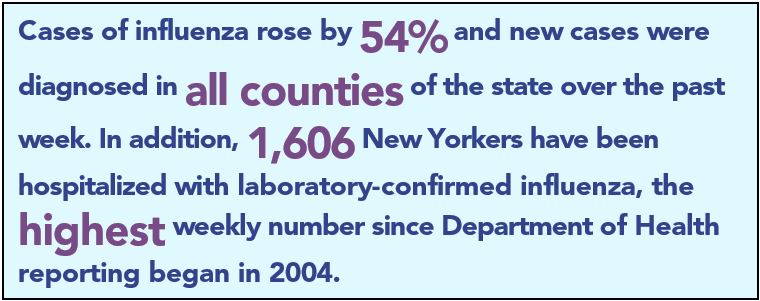Officials make plea to public for flu awareness

With several weeks left in the 2017-18 influenza season, local doctors and elected officials are urging residents to get the flu shot and take simple steps to stave off the spread of the disease.
“It is not too late for a flu shot and if you contract the flu, there is evidence that the flu shot can decrease the severity of symptoms and help stave off complications,” said Dr. Alan Mensch, MD, from Plainview Hospital. “It sounds simple, but you must cover your mouth when you cough or sneeze. This strain is particularly contagious and the flu virus can live on surfaces for 24 to 48 hours.”
This year’s flu strain, H3N2, is responsible for a growing number of hospitalizations and deaths throughout the state. According to the state Department of Health, cases of influenza rose by 54 percent and new cases were diagnosed in all counties of the state over the past week. In addition, 1,606 New Yorkers have been hospitalized with laboratory-confirmed influenza, the highest weekly number since Department of Health reporting began in 2004.
For the last six weeks, influenza has been geographically widespread across New York. As of Jan. 13, 17,362 laboratory-confirmed cases of influenza have been reported and 5,267 people in the state have been hospitalized with influenza this season.
 County Executive Lauren Curran reiterated the statements of Governor Andrew Cuomo, stating that it is not too late in the season to get the flu shot.
County Executive Lauren Curran reiterated the statements of Governor Andrew Cuomo, stating that it is not too late in the season to get the flu shot.
“Getting vaccinated is the single best way for people to protect not only themselves, but those around them, including people at high risk for serious complications, like babies, pregnant women, older adults and those with certain chronic medical conditions,” she said.
Dr. Lawrence Eisenstein, health commissioner for the Nassau County Department of Health, said that though the vaccine’s effectiveness can vary, those who are inoculated have a much better chance of fighting the flu should they contract it.
“Even though the effectiveness of the flu vaccine can vary from year to year, vaccinated individuals who contract the illness will usually have a milder course and are less likely to be hospitalized or die from flu-related complications,” said Eisenstein. “Flu season typically peaks on the East Coast in late winter, so it’s not too late to get vaccinated.”
The symptoms of the flu can vary from mild to severe illness and often come on suddenly. Symptoms may include fever, cough, sore throat, runny or stuffy nose, body aches, chills and fatigue. Some people may also have vomiting and diarrhea. The CDC recommends that antiviral drugs be used early to treat hospitalized patients, people with severe illness, and people who are at high risk of serious flu complications based on their age or health. Antiviral drugs are medications that can be used to fight flu illness and work best when started within two days of symptoms first appearing.
 “Tamiflu is the main treatment,” said Mensch. “Exactly how effective Tamiflu is seems up for debate, but we know that it can shorten the course of the flu by hours or a day. Tamiflu must be taken within 48 hours of the onset of symptoms. Once the flu takes hold, the drug is not effective.”
“Tamiflu is the main treatment,” said Mensch. “Exactly how effective Tamiflu is seems up for debate, but we know that it can shorten the course of the flu by hours or a day. Tamiflu must be taken within 48 hours of the onset of symptoms. Once the flu takes hold, the drug is not effective.”
Local school districts are also taking precautions in stemming the tide of flu cases among students. Patricia Ramond, MSN, BSN, RN, the Garden City School District’s lead nurse, said that several of the schools have seen seven to eight cases over the last two weeks and at one school, four of the cases were in the same class.
“I have encouraged parents to report illnesses and to keep their child home if sick,” said Ramond. “The state has requirements of school nurses that specify posting flu information in our buildings. All of the schools have posted the information.”
Ramond said that the information outlines symptoms and three recommendations from the CDC: Get the flu vaccine; preventative measures; take antivirals if prescribed.
“Preventatively, buildings have information posted about cough etiquette and hand washing technique,” she said. “I, for one, go from class to class and review these components with students as Kindergarten and first grade are an important time to learn these vital features of good hygiene.”
Mensch echoed those sentiments on maintaining personal hygiene as the first line of defense against the flu.
“Avoid touching things like handrails or banisters and then touching your face, especially your eyes, nose and mouth—the portals of entry,” he said. “Stay away from people who are sick and if you are sick, stay home and away from others. Wash your hands often and keep some Purell nearby.”


















